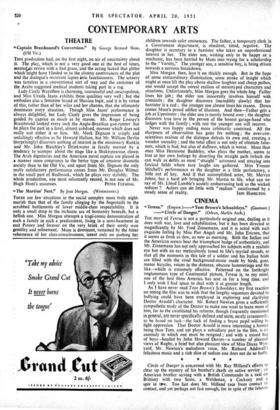"The Martins' Nest." By Joan Morgan. (Westminster.) THERE are few
situations in the social complex more truly night- marish than that of the family clinging by the fingernails to the scrubbed battlements of lower middle-class respectability. It is only a small drop to the inchoate sea of humanity beneath, but a hellish one. Miss Morgan attempts a tragi-comic demonstration of such a family in such a predicament, living in a semi-basement in east Putney and forever on the very brink of their sorely won gentility and refinement. Mum is dominant, sustained by the bitter vehemence of her class-consciousness, intent only on pushing her children towards safer eminences. The father, a temporary clerk in a Government department, is obedient, timid, negative. The daughter is secretary to a barrister who takes an unprofessional interest in her. The elder son, wishing only to be happy as a mechanic, has been harried by Mum into trying for a scholarship to the " Varsity," The younger son, a sensitive boy, is being driven towards a nervous breakdown.
Miss Morgan, then, lays it on thickly enough. But in the hope of some extraordinary illumination, some stroke of insight which might at once lift the play above shallow laughter and cheap pathos, one would accept the unreal realism of stereotyped characters and situations. Unfortunately, Miss Morgan goes the whole hog. Father loses his job ; the elder son innocently involves himself with criminals ; the daughter discovers (incredibly slowly) that her barrister is a cad ; the younger son almost loses his reason. Down comes Mum's proud edifice of illusions. And then—Father gets a job at Upminster ; the elder son is merely bound over ; the daughter discovers true love in the person of the honest garage-hand who lodges with the family ; with rest the younger son will recover.
Never was happy ending more arbitrarily contrived. All the sharpness of observation has gone for nothing ; the over-con- scientious realism of the dialogue defeats its own end, creating a wooden unreality ; and the total effect is not only of ultimate false- ness, which is bad, but also of dullness, which is worse. More than once Miss Hermione Baddeley, who plays the mother, seems to hint at her own feelings by deserting the straight path (which she can walk as deftly as most " straight " actresses) and straying into farcical fields where easy laughs are gathered. Miss Yvonne Mitchell's performance as the daughter is a little perfunctory, a little out of key. And if that accomplished actor, Mr. Mervyn Johns, has a hard job bringing Mr. Martin to life, what can we say of Mr. Lloyd Lamble's acutely embarrassing task as the wicked seducer ? Actors can do little with " realism " uninformed by a


































 Previous page
Previous page